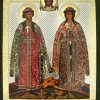In his “Catechism” Metropolitan Hilarion (Alfeyev) writes the following: “There is no personality in history who has had such an influence on the spiritual-moral development of mankind as Jesus Christ. Devoid of any characteristics of a social reformative nature, His teaching, throughout the centuries, has become the reason for profound and radical changes in all systems of interpersonal relationships between people — not only on the level of individual morality, but on the social level as well. Jesus did not call for the abolition of slavery, but thanks to the Christian understanding of the natural equality of people, slavery was finally abolished. He did not call for a revision of the political regime or of the codex of rights, but thanks to Christianity, mankind created those mechanisms of rights which today are the basis of the daily activities and functioning of many governments. Jesus was not a fighter for social rights. However, it is based on Christian teachings that the human rights exist which permit women and children to be fully valued members of society, that inequality of social rights have been abolished, signs of discrimination based on nationality or race have been abolished, as well as many other defects of societal structure which were characteristic of the ancient world.”(1)
Jesus said the following about the good deeds required for entering into the Kingdom of Heaven: “I was hungry and you gave me food, I was thirsty and you gave me drink, I was a stranger and you welcomed me, I was naked and you clothed me, I was sick and you visited me, I was in prison and you came to me…Truly I say to you, as you did it to one of the least of these my brethren, you did it to me” (Matt. 35-41). The disciples of Christ also took care of the orphans and the widows: “Religion that is pure and undefiled before God and the Father is this: to visit orphans and widows in their affliction, and to keep oneself unstained from the world” (James 1:27). Concerning helping and giving to those in need, Jesus said: “If any one forces you to go one mile, go with him two miles. Give to him who begs from you, and do not refuse him who would borrow from you” (Matt. 5:41-42); and in the Lord’s Prayer we ask the Father to “forgive us our debts as we forgive our debtors” (Matt. 6:12). At the time that Jesus and later His followers taught and practiced this love, kindness and generosity to their neighbors and those around them, Roman society and Roman law took a very different viewpoint. If someone could not pay a debt, they and their entire family (including the children) were imprisoned until the debt was paid. This was an impossible situation, because being incarcerated, how could someone earn the money to repay a debt? Thus, many, many people perished in debtor’s prison. If someone gave birth to an unwanted child, they were legally permitted to leave the infant in the street to die. The sick were often shunned and exiled from society, as we see with the lepers who Jesus visited and healed in the countryside, outside of the city environs. The concept of philanthropy (from the Greek, literally meaning “love of man”) was introduced into the world by the Christians, and very often the common folk and the bystanders, many who were the recipients of Christian charity, had a high regard for Christ’s followers. Is it any wonder that this small band who were persona non grata, this illicit Jewish sect who would grow from tens and hundreds into billions of believers, is it any wonder that without firing one arrow or throwing one spear, the imperial Roman eagle would eventually be replaced with the Cross, that instrument of the ignominious means of execution of an unpopular and hated son of a Jewish carpenter, now the symbol of hope, salvation and eternal life?
St. Dimitri of Rostov compiled a great collection of the Lives of Saints which is about 9,490 pages in length.(2) In the three hundred years since this collection was published, how many more saints have lived and died and have had their lives published? And how many more are the innumerable saints whose exploits we do not know, whose lives are not recorded, and whose spiritual struggles and gifts of the Holy Spirit are known only unto God? Someone may say, “I have never met a saint.” Sometimes it is because of the hardness of our hearts that we do not recognize the sanctity of someone with whom we might come into contact. Many people revered the great ascetic and miracle-worker St. John of San Francisco (+1966), but in his lifetime there were also people who mocked him, reviled him and even spat at him when he entered the church. Jesus Christ the Son of God walked on the earth, and how many are those who mocked Him, reviled Him, shook their fists at Him, hated Him and demanded His death on the Cross?
Personally, I don’t see so much of a dichotomy between the terms “believer” and “non-believer.” In a sense, everyone is a “believer,” because everyone believes in something. Even if you say that you believe in “nothing,” actually you still believe in something — nihilism. Modern day scientists speculate that there are various neuropyschological parts of every human brain which are responsible for spirituality, or what some scientists have called a “God spot.” Every human being has a spiritual and a metaphysical dimension. A person may not believe in Jesus risen from the dead and a person may not worship the Holy Trinity or pray to the saints, but we all worship and adore something. In this sense there are no atheists. Some people worship food and the belly is their god, others worship money, and for others carnal pleasures is their god, Some people just worship themselves. Freud associated religion with hysteria and neurosis. This created a divide between religion and mental health care, which has continued until recently. “Psychiatry has a long tradition of dismissing and attacking religious experience. Religion has often been seen by mental health professionals as irrational, outdated and dependency forming, and has been viewed to result in emotional instability. In 1994, “religious or spiritual problems” was introduced in DSM-IV as a new diagnostic category that invited professionals to respect the patient’s beliefs and rituals. Recently, there has been a burgeoning of systematic research into religion, spirituality, and mental health. A literature search before 2000 identified 724 quantitative studies, and since that time, research in this area has increased dramatically. The evidence suggests that, on balance, religious involvement is generally conducive to better mental health. In addition, patients with psychiatric disorders frequently use religion to cope with their distress.”(3) Patients who have a strong faith in God are today encouraged by psychiatrists to use their faith and trust in God as a major component in their “toolkit” to help them alleviate their mental and emotional suffering and anxiety. For centuries there was no help for the mentally ill, and psychiatric hospitals were no more than institutions offering custodial care. Psychotherapy and cognitive behavioral therapy created a revolution in treatment for the mentally ill. This is nothing new for the Christians, who for over two thousand years have recognized the spiritual and emotional healing powers of discussing and verbalizing one’s emotional distress, and the power of experienced guidance and direction from a genuine spiritual father or mother.
The Bolsheviks were unscientific and way off base when they preached that the concept of God was an outdated and irrelevant anachronism that would disappear by itself. Since faith in God did not disappear quickly enough for them, they tried to help it along by emulating the Roman emperors, such as Diocletian and Nero, by severely and cruelly persecuting the Christians. The Communists desecrated and blew up churches, plundered the sacred vessels, murdered and incarcerated the bishops, priests, monastics and lay people, but after 70 years of the most horrific repression, the Church survived, and in the Russian Federation of today, after the failed experiment of Communism and atheism, the Church is again free and flourishing. These “enlightened” Marxists preached “Land, Peace, Bread and Freedom” but gave none of these things to the people. “What man of you, if his son asks him for bread, will give him a stone?” (Matt. 7:9). Instead of peace they offered fear, anxiety and terror. They practiced suppression of freedom to express one’s ideas and beliefs and everyone had to tow the party line. They even suppressed artistic creativity (some of Russia’s most talented and gifted artists, writers, poets, entertainers, scholars and scientists perished in the Gulag). Russia literally turned red with the spilt blood of millions of martyrs as the Communists foisted hatred and slave labor upon the people. Private property was stolen (“appropriated for the state”). There was widespread destruction and desecration of the most beautiful and cherished works of art (the curator of one museum in Russia wept when he said that it took centuries to create these magnificent works of art and only seconds to destroy them). They created concentration camps, the notorious Gulag, and instead of providing food, they spread starvation and famine. St. Elizabeth the New-martyr built a convent with a hospital(4) which offered free medical care for anyone, yet the Bolsheviks closed down her hospital and brutally murdered her. What did the Bolsheviks gain by this vile act and what did they do for the indigent and suffering ill that she previously cared for? In Lesna (Viborgskii oblast, St. Petersburg) the Magdalene House of Mercy was built as a school for women who had fallen into a depraved life, and in the words of its founder, a woman named Sarah Buhler, its purpose was to help women who wanted “to repent and return to a life of honest labor.” The Bolsheviks destroyed this school too, and with it they destroyed the hope and chance for these women. The great utopia that the Communists promised Russia became instead the greatest nightmare that the world has ever witnessed.
Not every Christian has achieved the great spiritual heights of a Seraphim of Sarov or a John of Kronstadt, but all Christians, including the greatest saints, consider themselves to be the worst of sinners. Before receiving Holy Communion every Orthodox Christian prays: “I believe, O Lord, and I confess, that Thou art truly the Christ, Son of the living God, Who camest into the world to save sinners, of whom I am the first.” This expression of a pure and guileless heart is the basis of Christian love and faith — humility. Fr. Alexander Schmemann said that “no one talks about their shortcomings and sins more than believers themselves.”(5) Repentance is the cornerstone of salvation, and the daily, hourly and minute by minute activity of the Christian, as demonstrated by the Jesus Prayer: “Lord, Jesus Christ, Son of God, have mercy on me a sinner.” The first words preached by John the Baptist and later by Jesus Himself as recorded in the Gospel are “Repent! For the Kingdom of Heaven is at hand!” (Matt. 3:2; 4:17). Christian faith is not merely just another system of morals or ethics. It is not a superstitious external fulfillment of rituals that will guarantee happiness, comfort and success in our lives. Above all, Christianity is a personal and real experience of the true and living God Himself which takes place in the depth of one’s very own being, an experience that is positive, bright and joyful. It is this experience which permeates and fills one’s entire soul with love, patience and hope. When the newly baptized Christian emerges from the baptismal font, he is not automatically now a saint by some kind of external mechanical means. The road to seek moral perfection is a lifetime of diligent struggles and prayer. The Christian weeps for his sins and wages daily spiritual warfare, at the same time caring for and praying for the world. Jesus says: “I did not come to judge the world but to save the world” (John 12:47). If we understand that the Church is a hospital and that we are all spiritually ill and in need of healing, and if we take the medications and follow the prescriptions that the Church offers for our healing (for example, frequent participation in the Holy Mysteries, especially the Eucharist, and attendance at the Divine Services), then with this attitude we will find ourselves on the right path and our lives will be changed. And when one life is changed, then in a small way the world changes too. St. Seraphim of Sarov once said, “Acquire the Spirit of peace [the Holy Spirit], and a thousand around you will be saved.”(6)
_____________________________________________________________________________________
Footnotes
1. Катехизис, Краткий путеводитель по православной вере. Изд. 4-е. Митрополит Иларион (Алфеев), Издательский дом “Познание,” 2018. Часть II, стр. 130.
2. Житiя Святыхъ, Св. Димитрiй Ростовскiй, Москва, Синодальная Типографiя, 1904. Перепечатал Свято-Троицкий Монастырь, Джорданвилл, Н.Й., 1968.
3. “Religion, Spirituality, and Mental Health,” Simon Dein, FRCPsych, PhD, Psychiatric Times, Vol 27 No 1, Issue 1, January 10, 2010
4. Martha and Mary Women’s Monastery of Mercy, Ulitsa Bol’shaya Ordynka, 34, Moscow.
5. A Voice for Our Time, Radio Liberty Talks Vol. 1, Alexander Schmemann, SVS Press, Yonkers, NY, 2021, page 59.
6. A conversation of Saint Seraphim of Sarov with N.A. Motovilov : a wonderful revelation to
the world, Holy Trinity Monastery, Jordanville, NY, 1962.

















